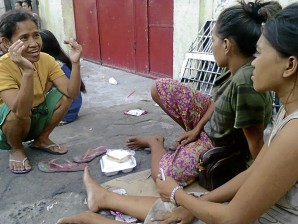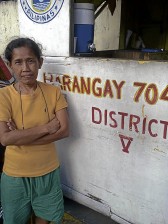Badjao beggars on her mind

WOMAN TALK Salud, aka Nanay Nursing, serves as DSWD’s point person extending aid and counsel to fellow Badjao women who ended up homeless in Ermita, Manila, after leaving their native provinces in Mindanao. DSWD
Troubled by the rising number of Badjao tribesmen flocking to the cities to beg for alms especially during Christmas, Nursida Salud vowed to do something about it.
“It’s as if they have lost all hope,” said Salud, herself a Badjao who hails from Campo Islam, Zamboanga City. “Our people have no sense of direction.”
“Nanay Nursing” is a facilitator of the Department of Social Welfare and Development (DSWD) for its various programs for the migrant Badjao. Over the past few weeks, for example, she has been visiting “transient areas” where members of the scattered ethnic group can be found in large numbers.
According to the DSWD’s National Capital Region office, about 80 percent of the mendicant Badjao find refuge in Moonwalk, Bulaong and San Dionisio in Paranaque City; Maharlika and Marantao in Taguig City; and Barangay (village) 704 in Ermita, Manila. They fan out during the day to go begging as far as Monumento in Caloocan City in the north and Pasay City in the south.
Article continues after this advertisement
‘Sea gypsies’ avoiding conflict
Article continues after this advertisementSalud and five other facilitators wear many hats—as monitors, counselors, educators, coordinators—to link up with local governments, civic groups and nongovernment organizations that could offer short- or long-term assistance to the estimated 225 Badjao families identified by DSWD-NCR this year.
Described as “sea gypsies” in their home provinces of Zamboanga, Jolo, Basilan, Sulu and Tawi-Tawi, the Badjao people have been leaving their ancestral land in waves over the past decade to look for better opportunities and to avoid the armed conflict, according to DSWD-NCR coordinator Rosecindy Larrobis.
These “victims of circumstance,” she said, arrive in urban areas with little or no working skills, hence they mostly end up begging in the streets. Their numbers swell toward the Christmas season, as early as October, then taper off after the holidays as they trickle back to the provinces.
Salud noted that, in the past, the majority of Badjao migrants would rather take jobs as vendors, street sweepers or domestic helpers than go panhandling. “I myself sold vegetables and accepted laundry jobs. But begging? I haven’t done that.”
Before joining the DSWD, Salud worked for the nongovernment organization Sun for All Children Inc. Her income helped support her son’s studies.
Today, under a DSWD program dubbed Liberating Indigenous People from Indignity (Lipi), she tries to spread hope and encouragement among her people. “I keep telling them: ‘Go find real work.’”
She said she is most concerned about the Badjao children, telling their parents to enroll them in school.
Cash-for-work
Through Lipi, a number of Badjao migrants have found work in Metro Manila as street sweepers, laborers and park attendants. “Our cash-for-work programs hire the Badjao to help maintain the cleanliness in the barangays where they stay, something which is appreciated by the other residents,” Larrobis said.
At least 130 Badjao men and women benefited from the cash-for-work program in the NCR in 2011.
Dozens more attended livelihood seminars on soap-making and pillow-making, for example. Lipi’s education program also helped improve their personal hygiene.
In a tie-up between the DSWD and Teatro Filipino Integrated, some Badjao women also found themselves “sharing their culture and telling the story of their lives” through dance and were invited to perform in schools and other government events, Larrobis added.
Ammisia Adjarani, thanked Salud and the DSWD on behalf of her fellow Lipi benefeciaries: “Thanks to them, our condition has been recognized and addressed. With their help, I learned new skills that could keep me off the streets and make me proud again as a Badjao.”
Another beneficiary, Alkiya Tamsilami, added: “We deeply appreciate their assistance especially in sending our children to school.”
Indeed, that’s precisely Nanay Nursing’s mission: “I want them to have something to be proud of. Together we can do this. It’s all for us Badjao.”
